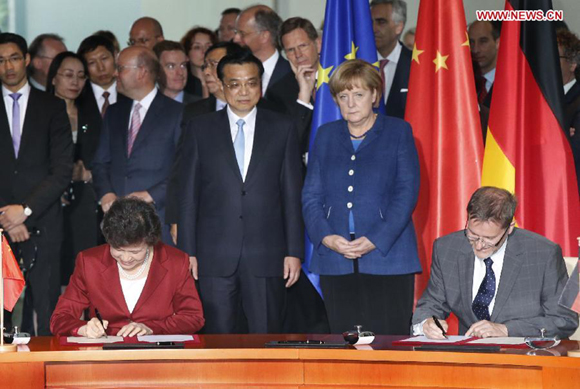Chinese, German PMs agree to promote cooperation
 0 Comment(s)
0 Comment(s) Print
Print E-mail China.org.cn, May 27, 2013
E-mail China.org.cn, May 27, 2013
Visiting Chinese Premier Li Keqiang and his German counterpart Angela Merkel held talks Sunday to map out future bilateral cooperation and reached an important consensus on deepening the strategic partnership between the two nations.
|
Chinese Premier Li Keqiang (L Center) and German Chancellor Angela Merkel (R Center) attend a signing ceremony after their talks in Berlin, capital of Germany, May 26, 2013. [Xinhua photo] |
Noting both China and Germany are countries with global influence, Li said that "the significance of China-Germany ties goes quite beyond bilateral relations and bilateral ties have already entered a new phase of fast development."
He said stepping up China-Germany cooperation not only conforms to the interests of the two countries, but also benefits China-EU ties and the whole world.
China is ready to work with Germany to further promote their multi-layered and wide-ranging cooperation to push bilateral ties to a new high, he said.
The Chinese premier said the two countries should strengthen strategic communication by keeping up the current mechanisms of annual leaders' meetings and intergovernmental consultations, and enhance communication and coordination on regional and international affairs.
At present, China is stepping up efforts to realize industrialization,informatization, urbanization and agricultural modernization to upgrade its economy, said Li. "That will offer more opportunities for cooperation between the two countries."
To take full advantage of these opportunities, the Chinese premier suggested closer cooperation between the two countries' manufacturing industry on standard-making, technological innovation and personnel training, while deepening collaboration on developing information and communication technologies.
On implementing the China-Germany urbanization partnership, Li called for exemplary cooperation on building low-carbon eco-cities.
He also suggested establishing a dialogue mechanism of agriculture ministers to enhance cooperation on developing modern agriculture and enhancing food security.
He said the two countries should keep close contacts in fiscal and financial fields by setting up a dialogue mechanism that involves both the finance ministers and central bank governors.
He also suggested launching the China-Germany council of economic advisers, a Chinese chamber of commerce and an investment promotion agency in Germany.
In addition, the two countries should have closer cultural and people-to-people exchanges, Li said, citing "the Year of Languages" initiative and a student exchange program that would help enhance mutual understanding and pass on China-Germany friendship to future generations.
Li also underscored China's relations with the European Union (EU).
"Germany is the first EU country I visit since taking office as Chinese premier," Li said. "That shows the new Chinese leadership highly values China's relations with the EU."
China always sees Europe from a strategic point of view and firmly supports Europe's integration and the EU's efforts to tackle the debt crisis and maintain economic stability in Europe, the Chinese premier said.
China-EU relations face new opportunities as this year marks the 10th anniversary of the establishment of the China-EU comprehensive strategic partnership, Li noted.
He called on both sides to grasp the overall situation and the mainstream of their cooperation and properly handle their differences in order to make new strides in China-EU ties.
Li noted that China stands firmly against the EU's recent proposals to open anti-dumping and anti-subsidy investigations into solar energy and mobile telecommunications equipment imported from China.
"The abuse of trade remedy measures would only send a wrong signal of trade protectionism to the outside world and negatively affect the business, industries and jobs of both countries," Li said.
China hopes to properly settle the issue through dialogue and consultation, instead of engaging in a trade war, he said.
China and Germany share common grounds in opposing trade protectionism, said Li, urging the German side to play a positive role in pushing the EU to defuse the frictions with China through dialogue and consultation and safeguard the overall Sino-EU economic and trade cooperation.
Merkel, for her part, said Germany and China have carried out smooth cooperation on politics, economy, diplomacy and culture, adding the two countries have very close ties and their relations have reached an unprecedented high level.
China has significant global influence and is an important cooperative partner for Germany, Merkel said.
Germany is ready to deepen its cooperation and strengthen exchanges and mutual-learning with China to jointly push forward the development of their strategic partnership, she said.
Germany supports stronger EU-China cooperation, said Merkel, adding that it believes the two sides should use dialogue and consultation to resolve the problems in their cooperation, make efforts to expand trade volume while avoiding frictions, so as to achieve mutual benefits and win-win results.
Following their talks, the two leaders witnessed the signing of a host of documents on bilateral cooperation in investment, energy saving and environmental protection, agriculture and education.
Before their meeting, they officially launched "the Year of Languages" program between China and Germany.
Germany is the last leg of Li's ongoing trip, which has already taken him to India, Pakistan and Switzerland.






